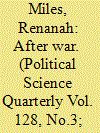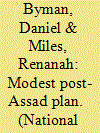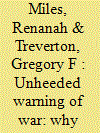| Srl | Item |
| 1 |
ID:
123104


|
|
|
|
|
| Publication |
2013.
|
| Summary/Abstract |
RENANAH MILES examines recent stabilization and reconstruction missions in Afghanistan and Iraq. She analyzes persistent shortfalls in the ability of the State Department and the U.S. Agency for International Development to conduct these missions. She contends that organizational culture and bureaucratic turf wars undermine civilian leadership and encourage the military to compensate in its absence.
|
|
|
|
|
|
|
|
|
|
|
|
|
|
|
|
| 2 |
ID:
123652


|
|
|
|
|
| Publication |
2012.
|
| Summary/Abstract |
SHOULD SYRIAN president Bashar al-Assad fall, Syria's problems will have only just begun. With the dictator gone, crime, score settling and a violent contest for power likely will ensue, keeping the streets unsafe and the people afraid. Iran, foreign jihadists and Syria's neighbors may meddle to protect their interests or stir up trouble. Assad kept Syria's rival communities in check through force, but his reign created underlying schisms. Now, the civil war has generated new ones. It also has turned the country's economy, always struggling, into a disaster area. So far the splintered Syrian opposition has shown no skill in reassuring Syria's minorities, and any new government's initial legitimacy is likely to be weak.
|
|
|
|
|
|
|
|
|
|
|
|
|
|
|
|
| 3 |
ID:
153073


|
|
|
|
|
| Summary/Abstract |
This article examines the lack of policy response to the 1990 U.S. National Intelligence Estimate (NIE) that predicted the collapse of Yugoslavia. Contrary to common criticisms of estimative intelligence, the NIE was accurate and unambiguous. Why was good intelligence unheeded? For some policymakers, the analysis was not closely tied to their interests and competed with other priorities for attention; for those who were substantive experts, the NIE’s grim message was hard to accept. Moreover, policymakers read intelligence reports in the context of popular concepts – a lingering Cold War lens distorted more than it clarified. Finally, while the NIE made hard-hitting judgments, it did not include any analysis of opportunities to influence the outcome. Rather than pushing an already difficult estimate to the breaking point, including opportunities would likely have increased the odds of policymakers taking action. These lessons have broader implications for analytical tradecraft and the often-challenging relationship between intelligence and policy.
|
|
|
|
|
|
|
|
|
|
|
|
|
|
|
|